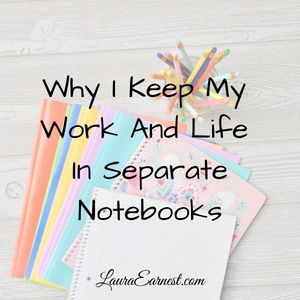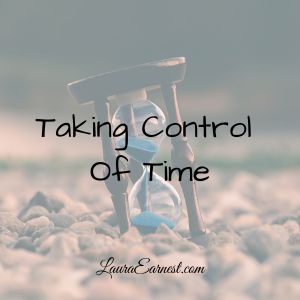There are a lot of productivity systems out there that insist that you have to keep everything in one place. There is a solid logic behind this stance: one place means you never have to decide where to put things, and you never have to figure out where to look. One life, one system.
But there is another side too. There are just as good reasons to maintain separate systems for work and non-work parts of your life. Today I will go over my reasons for maintaining two separate systems.
One Planner to Two Separate Notebooks
Long ago, when I first started on this path, I kept everything in one place. Of course, that was in the days when only paper planners were available. As electronic systems moved in, I experimented with them. That is when my systems diverged. Even now that I use a Bullet Journal, I still keep separate notebooks.
I think much of it has to do with work and life balance. I have a very busy life outside of work, and I don’t need to be reminded of work when I am trying to do my side gigs or volunteer. Likewise, I don’t need to be thinking about the blog when I am trying to work. It’s an exercise in compartmentalization that allows greater focus on what I am doing because I remove the distractions.
The Differences Between My Systems
I think that deviating from what is recommended is justified if you have significant reasons for doing so.
Differences in Tracking
I track different things in my work and non-work time. My work as an IT consultant means I have to track multiple clients, projects and software designs. I also need to keep track of what I did on any given day for both timesheets and status reports.
Non-work tracking is everything from daily schedules to book ideas to reflections on my reading to tracking my habit streaks.
Differences in Referencing the Past
For my non-work, I don’t need to reference past notebooks. At the end of the year I transfer anything that needs to move forward to the new notebook.
For work, I will often have to reference old notes. We may need to know what we were doing two years before, or what was talked about during meetings with vendors. Having all my work notes in a single set of notebooks means that I just have to find the vendor page or date to retrieve information.
Differences in Approach
In my work, I have big projects that get broken down into a series of log notes,code features and designs. Having a log for each of the projects allows me to track what was done when. Breaking the projects down into the code features allows me to work multiple facets of the project at the same time. I can make notes about what needs to be in separate features even if I am not actively working on them. Everything gets threaded and it is not unusual for me to have dozens of pages that are linked for a single overall project.
My non-work notes are much more free-flowing. I have trackers [insert link] in them to make it easy to see trends, but other information is more free form. I seldom have to thread pages as a continuation.
Differences in Balance
My non-work time is filled with a multitude of activities. I have to make sure that I am working on the things that need to be worked on. Otherwise I will find myself doing something that either appeals to me in the moment or something that doesn’t have a due date, forgoing things that do. I need to balance my activities by due date, effort, and my energy level.
Work time is very concentrated, and sometimes I forget to take time to think and design before putting my hands on the keyboard. This means that I will get through a chunk of programming just to realize I should have accounted for something and now have to go back and redo work. I need to balance my time between programming and design (and the horrible waste of time meetings).
A Word About Legal
I’ve had it happen twice that I have been deposed as part of a lawsuit. One was against the consulting company I worked for, and one was an client’s employee suing the client.
In both cases, my work notes came into question.
In the first case, I was able to demonstrate that my status reports included information about a time-sensitive deadline that was approaching, and the client’s consistent pushing the needed work off. They had tried to sue my company saying that we never told them that work was necessary or that it had a deadline. With my notes I was able to locate the exact status reports with the information so that my company could pull the exact documents sent to the client.
In the second case, which centered around some remarks made in a meeting, I was able to demonstrate that I was out sick on the day in question.
I never want my personal notes to be perused by an attorney. My work notes remain separate so that I never have to hand them over for a legal dispute.
Over to You
I think that there are some very good reasons on why you should consider splitting up your productivity systems. Do you do so? How did you make that determination? Share below.







